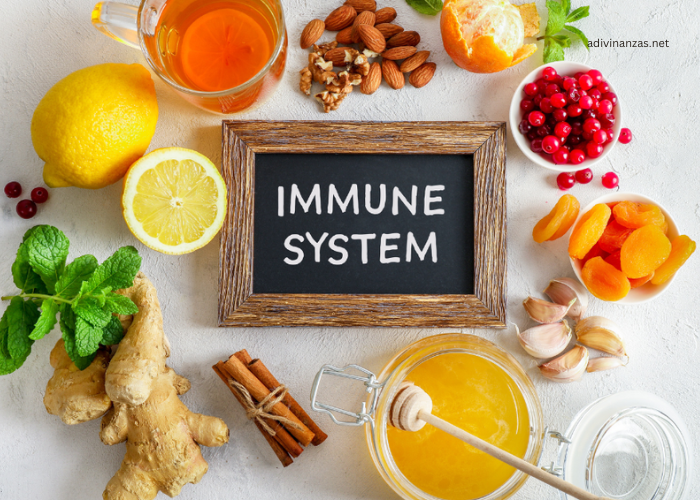A strong immune system is essential for protecting your body against infections and illnesses. While a balanced diet, regular exercise, and adequate sleep are fundamental for immune health, there are several natural remedies that can further support and strengthen your body’s defenses. From herbs and supplements to lifestyle changes, here are some natural ways to boost your immune system.
1. Vitamin C-Rich Foods
Vitamin C is known for its immune-boosting properties, playing a vital role in protecting cells and supporting the production of white blood cells, which fight infections. Eating foods rich in vitamin C can help strengthen your immune defenses. Some excellent sources include:
- Citrus fruits like oranges, lemons, and grapefruits
- Berries, such as strawberries, blueberries, and raspberries
- Bell peppers
- Broccoli
- Kiwi
- Pineapple
2. Echinacea
Echinacea is one of the most widely used herbs for supporting immune function. Studies suggest that it may help reduce the duration and severity of cold symptoms. It is thought to stimulate the production of white blood cells, enhance the body’s ability to fight off infections, and reduce inflammation. Echinacea can be taken as a tea, supplement, or tincture.
3. Garlic
Garlic has been used for centuries for its medicinal properties, particularly for its ability to boost the immune system. Garlic contains compounds like allicin, which have been shown to enhance immune function and fight bacteria, viruses, and fungi. Incorporating garlic into your diet—whether raw, cooked, or in supplement form—can help strengthen your immune defenses.
4. Ginger
Ginger is another potent herb with immune-boosting properties. It has anti-inflammatory and antioxidant effects, which help promote overall immune health. Ginger is also known for its ability to help with nausea and digestive issues, making it a great remedy for supporting both immune and digestive systems. You can add ginger to your meals, smoothies, or enjoy it as a hot tea.
5. Probiotics
Probiotics are beneficial bacteria that support a healthy gut, which is a significant part of the immune system. A large portion of your immune system is located in the gut, and maintaining a healthy gut microbiome is essential for proper immune function. Probiotics can be found in fermented foods like:
- Yogurt
- Sauerkraut
- Kimchi
- Kefir
- Miso
- Tempeh
Supplements containing probiotics are also available for those who prefer an easier way to incorporate them into their routine.
6. Turmeric
Turmeric contains curcumin, a powerful compound known for its anti-inflammatory, antioxidant, and immune-supporting properties. Curcumin helps regulate the immune system, supports healthy cell function, and reduces inflammation. To reap the benefits of turmeric, you can incorporate it into your cooking or consume it as a supplement. Adding black pepper with turmeric enhances the absorption of curcumin in the body.
7. Honey
Raw honey, particularly Manuka honey, is known for its antimicrobial and anti-inflammatory properties. Honey can help soothe sore throats, fight off infections, and reduce inflammation. It has also been shown to enhance immune function by promoting the production of immune cells. A spoonful of honey in tea or water can be a soothing and health-boosting addition to your diet.
8. Sleep
Getting adequate, quality sleep is one of the most important factors in maintaining a healthy immune system. During sleep, your body repairs and regenerates cells, including those that are part of the immune system. Chronic sleep deprivation can weaken immune function and make you more susceptible to illness. Aim for 7-9 hours of sleep each night to support immune health.
9. Exercise
Moderate, regular exercise has been shown to improve immune function by increasing the circulation of immune cells in the body. Physical activity can reduce inflammation, improve blood flow, and help the immune system fight off infections more effectively. Activities such as walking, yoga, swimming, or cycling are great ways to keep your immune system strong without overexerting your body.
10. Stress Management
Chronic stress can suppress the immune system, making you more vulnerable to illnesses. Finding ways to manage stress, such as practicing mindfulness, meditation, deep breathing exercises, or engaging in hobbies, is essential for immune health. Reducing stress can improve the function of immune cells and help maintain balance in the body.
11. Hydration
Drinking plenty of water is crucial for maintaining a healthy immune system. Water helps carry nutrients to cells, remove toxins, and support overall cellular function. Staying hydrated also helps to keep mucous membranes in the respiratory system moist, which is important for defending against pathogens.
Conclusion
Maintaining a strong immune system is essential for overall health and well-being. While there is no single miracle remedy, incorporating natural remedies like vitamin C-rich foods, garlic, ginger, turmeric, probiotics, and honey, along with lifestyle practices such as adequate sleep, stress management, and exercise, can go a long way in supporting your immune health. Always consult with a healthcare professional before starting any new supplements or making significant changes to your routine to ensure they are right for you.

